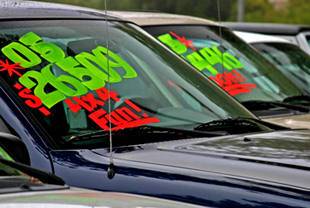How Wall Street's Woes Affect Car Shoppers

Unless you have Bill Gates’ credit history — or you are Bill Gates — you may have trouble getting a loan to buy a car these days, dealers say.
It isn’t the price of gas that’s keeping people from buying cars, automakers say, it’s car shoppers’ inability to get loans that’s making them leave showrooms empty-handed. Dealers confirm that theory as well.
Credit is tight, and banks that are already treading water from carrying too many high-risk mortgages are shying away from adding to their woes by making auto loans.
When Lehman Brothers, a huge investment banker in business since before the Civil War, filed for bankruptcy Monday, the credit troubles were magnified.
“Gas at $4 a gallon changed the type of vehicles people buy. The credit crunch, however, has changed their ability to buy,” said Bill Stasek, a Wheeling, Ill., Chevy dealer. “When they do get approved for a loan, sometimes it’s for less money than they wanted.”
“Some banks have stopped making loans for used cars, some for new cars, and some simply have stopped making any auto loans,” said Paul Cook, general manager of Larry Roesch Chrysler-Jeep-Dodge in Elmhurst, Ill.
Banks are actually checking credit references on loan applications and are more particular about credit histories, one dealer said.
“When banks were making money on mortgages, they were willing to absorb some losses on car loans, but they’re more stringent now,” said Mark Scarpelli, a Chevrolet dealer in Antioch, Ill. “If there’s a bump or bruise on your credit history, the loan will be rejected.
“Some banks insist they haven’t stopped giving auto loans, but they’re charging such high interest they don’t get any auto loan business.”
Dealers admit losing sales because their customers couldn’t get loans, but they wouldn’t say how many sales have been lost. General Motors marketing chief Mark LaNeve, however, says GM alone is losing up to 12,000 sales a month because of credit problems. Chrysler and Ford are suffering as well, though their numbers appear to be lower.
“We’re absolutely losing sales from the credit-crunch challenge,” Stasek said. “There are fewer sources willing to make a loan to those who aren’t prime credit customers. If banks are willing, they’re lending less money and demanding higher down payments than a year ago, and that costs us business.”
Dealers say the most credit-worthy customers are having no trouble getting approved for a loan, but when they’re approved they find banks charging them higher interest rates than they were expecting— or willing — to pay.
If a customer can’t get a loan from a local bank or savings and loan, an alternative is to use the automaker’s captive financing subsidiary, like GMAC or Ford Motor Credit.
“The captives historically were more aggressive in giving loans, but they’re as tight as banks now,” one dealer said.
Also in danger are shoppers who are upside down on their trade-in, meaning they owe more than the car is worth. For many years, those shoppers would just roll the amount they owed into their new car purchase. Not anymore.
“Rolling over a loan has become very difficult,” Scarpelli said. “Banks don’t wants to advance more money on a new car when the lender is already upside down on the old one.”
And what if you want to buy a big gas-guzzling SUV whose residual value is likely to continue falling over the life of your loan?
“Some banks have sent notice that if they make a loan it will only be on 85% of the invoice on a big SUV,” Stasek said, so you should expect to pay more for your down payment.
Featured stories




